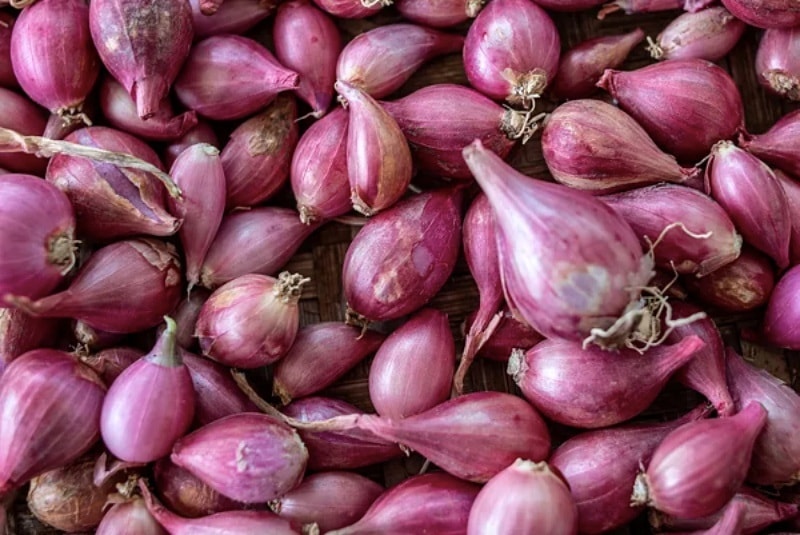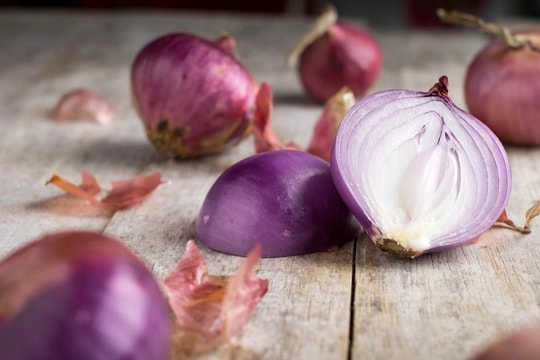Surprising health benefits of purple onions
Onions are used for both their nutritional and aromatic properties in cuisines around the world. They are rich in antioxidants, vitamin C, minerals...
Onion is an herb that is often prescribed as an effective remedy for a number of ailments in traditional medicine. In fact, it has been used to treat many physical conditions for thousands of years. Onions are beneficial in reducing inflammation, muscle aches, swelling, and water retention.
Like other similarly flavored herbs, including onions and garlic, shallots can be eaten raw or cooked, making them versatile and easy to incorporate into recipes.
Additionally, studies show that eating onions may help fight cancer, reduce food allergies, and boost detoxification.
Here are some of the prominent health benefits of onions:

Purple onions have many health benefits (Photo: Gettyimages).
High source of antioxidants
Purple onions contain more flavonoid and phenol antioxidants than most other members of the onion family. This makes them one of the best anti-inflammatory foods for reducing free radical damage and fighting many chronic diseases.
The two groups of compounds that account for most of the known medicinal properties of onions are sulfur compounds, such as disulfides (APDS), and flavonoids, such as quercetin.
According to a report published in the Indian Journal of Experimental Biology, both onions and garlic contain protective sulfur-containing compounds, mainly in the form of cysteine derivatives called cysteine sulfoxides. These are broken down when we eat them.
Because it contains a large amount of sulfoxides, the essential oil of purple onions (and other onions) has antidiabetic, antibiotic, cholesterol-lowering, fibrinolytic, and many other biological effects.
This means they can help control blood sugar levels, help prevent insulin resistance, fight bacterial and viral infections, help lower cholesterol naturally, and prevent blood clots.
Other studies have also shown that allium vegetables have anti-inflammatory and antibacterial properties that benefit the skin, blood vessels, digestive organs and muscle tissue.
Anti-cancer
Research published in the Asia-Pacific Journal of Cancer Prevention in 2012 found that ethyl acetate extract (EEO) found in purple onions and other onions has a strong inhibitory effect on the enzyme animal fatty acid synthase, helping to slow the growth of cancer cells.
The ability to induce apoptosis, or self-destruction and destruction of dangerous cells, has been well studied in allium vegetables. This appears to be particularly beneficial in fighting some of the most common cancers, including breast, stomach, and colon.
Results from one study suggest that consuming allium vegetables may significantly reduce the risk of stomach cancer.
May improve heart health
Several antioxidants in onions, including allicin and quercetin, are considered antihypertensive.
Based on human and animal studies, quercetin in onions may lower blood pressure. Allicin is a special and rather unique compound found in chives, garlic, and other onions that is released when we puncture their skin.
According to a 2013 review conducted by the Department of Applied Biology at the Hong Kong Polytechnic University, allicin was found to have cardioprotective effects by enhancing antioxidant status and reducing levels of reactive oxygen species as well as stimulating glutathione production.
Glutathione is known for its powerful health-promoting abilities in many ways.
Onions are also a good source of potassium. Potassium helps regulate the amount of fluid in the body and plays an essential role in the functioning of nerves, muscles, and the heart.
Eating plenty of potassium-rich foods supports a healthy metabolism because this mineral is needed to break down carbohydrates into usable energy. Additionally, potassium is linked to heart health by helping to lower high blood pressure and offset the effects of a high-sodium diet.
May help fight obesity
Some studies have found that EEO found in onions can also inhibit lipid accumulation and may help prevent obesity.
Because obesity is closely linked to heart disease, diabetes and cancer formation, onions may be helpful in preventing weight gain and obesity-related complications, such as metabolic syndrome.
Helps prevent or treat allergies
Results from several studies have shown that onions have promising anti-allergic effects which may be due to their antihistamine, anti-inflammatory and antioxidant activities.
Has antibacterial and antiviral properties
Both onions and garlic produce biochemical reactions known to have anti-infective, anti-viral, and anti-inflammatory effects.
When various immune parameters of onions were studied, researchers found that the antioxidant enzymes of this vegetable (especially superoxide dismutase and glutathione peroxidase) also help fight common illnesses and more serious infections.
Onions have also shown antifungal activity against a variety of fungi in several studies, including candida.
Research has found that onions contain natural antibacterial properties that can help alkalize the body and fight off even the most powerful, potentially deadly forms of bacteria. Allicin, found in chives, onions, and garlic, is also a powerful antibacterial that can protect against a wide range of bacteria.
Improve circulation and detoxification
Both onions and garlic are said to help remove carcinogens and toxins from the digestive tract due to their ability to increase circulation.
Onions can help stimulate digestive enzymes, heal the gut, reduce oxidative stress in the digestive organs, and prevent inflammation associated with food allergies or sensitivities.
They are also effective ingredients in detoxifying the liver.
May help control blood sugar levels
Onions are known to be natural anti-diabetics as many studies have shown that they have beneficial effects on insulin and may also help control weight gain.
Onions and other onions are considered part of a natural diabetes diet because they prevent hypoglycemia and stimulate insulin secretion. This reduces the inflammatory response associated with diabetes and other autoimmune diseases.
Eating lots of onions may lower blood sugar levels in people with diabetes, possibly by blocking the breakdown of insulin in the liver, according to researchers from the University of Michigan.
APDS compounds in onions have been shown to block the breakdown of insulin in the liver and may stimulate the pancreas to produce insulin, helping to increase blood insulin levels and reduce glucose in animal studies.






